Each person in the Federated States of Micronesia, Fiji, and Papua New Guinea, generates about one kilogram of waste each day, but these island nations face the added burden of large amounts of other countries’ plastic waste washing up on their shores.1 This issue is exacerbated by several waste management challenges including irregular and inefficient waste collection systems; limited recycling markets and land for final disposal; and insufficient financial resources, government capacity, and regulatory frameworks.
It is estimated that many urban areas—which comprise 35 percent of the total Pacific Island population or roughly 4.3 million people—collect less than half of the municipal solid waste generated. Given the islands’ limited recycling capacity, most waste is illegally dumped in vacant areas, the ocean, or collected in piles and burned. Waste burning releases harmful chemicals, impacting public and environmental health and contributing to climate change. By 2040, if corrective measures are not implemented, the annual volume of plastic entering the ocean from the Pacific Islands is expected to triple.
Impacts and Results

In the Pacific Islands, program impacts (to date) include:
- Secured and prevented 1.85 metric tons of plastic and other low-value waste secure–the equivalent of more than 50,000 plastic bottles–from leaking into the environment through recovery efforts that diverted material from landfills and routed materials back to the circular economy.
- Trained 190 individuals trained from local government, the informal waste sector, and local organizations to build local capacity for solid waste management planning and programs.
- Improved waste systems and services for approximately 84,000 individuals or about 500,000 households, through support to and partnerships with government entities, local organizations, and businesses. In Fiji, for example, the program and its partners, Waste Recyclers (Fiji) Pte Ltd and Pacific Recycling Foundation, established waste and recycling collection points in communities that have previously not been reached by waste collection services, creating cleaner communities and enabling materials consumed on the island to enter back into the local circular economy.
- Formed 7 partnerships with local governments and organizations to strengthen waste collection and build sustainable, circular economies.
Program Grantees
- Pacific Island Recycling Foundation in collaboration with Waste Recyclers Fiji Ltd and as part of Fiji’s national solid waste strategy will design and build I-Recycle Hub Bins in Suva City to make recycling more user-friendly.
- Catholic Relief Services (CRS) Micronesia’s Communities Recycle – Empowering Artisans, Transforming Environments (CREATE) project uses an integrated approach that prevents plastic waste and other pollutants from entering the ocean through strengthened governance and value chains, while improving and diversifying livelihoods in Pohnpeian communities. Through the grant, CREATE is piloting an upcycling technology hub for plastics and engaging local stakeholders and community members to promote improved solid waste and 3R practices.



